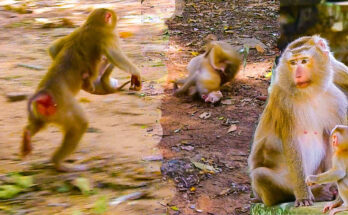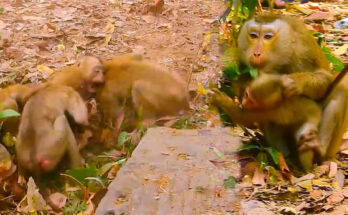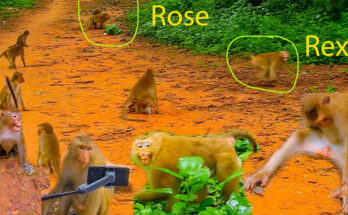Here’s a possible draft:
Crying Baby Monkey, But Mom Ignored
In the heart of a dense tropical jungle, where the trees stood tall like ancient sentinels, a tiny baby monkey clung to a branch, its cries echoing through the foliage. The soft whimpering grew louder, almost desperate, but its mother paid no attention. She sat a few feet away, grooming herself with deliberate indifference, as if the wails of her offspring were nothing more than the rustling of leaves in the wind.
The baby, no more than a few weeks old, had been struggling to keep up with the troop as they moved through the canopy. Its tiny limbs, still weak, trembled as it reached out for its mother’s warm embrace. But she did not turn to comfort it. Instead, she continued her grooming, her sharp nails picking through her fur, completely ignoring the little one’s distress.
This behavior was not uncommon among primates. While most monkey mothers are known for their nurturing and protective nature, some display an unexpected coldness toward their young. Scientists and primatologists have observed cases where mothers neglect or even reject their babies. The reasons for this vary—some are inexperienced first-time mothers, some may sense that their offspring is weak or ill, and in some cases, the social structure of the troop plays a role.
For this particular baby monkey, the rejection was heartbreaking. It tried once again, stumbling toward its mother, its tiny fingers reaching for her fur. But she turned away. The other monkeys in the troop chattered and moved about, uninterested in the painful scene unfolding before them. The jungle, full of life and noise, carried on as if the suffering of the baby did not matter.
The little monkey’s cries grew softer as exhaustion set in. Without its mother’s warmth and nourishment, survival would be difficult. Baby monkeys rely on their mothers not only for food but also for social learning and protection. They need the comfort of touch, the guidance of a parent, and the reassurance that they belong. In the absence of this bond, the baby was left vulnerable.
However, nature is unpredictable, and sometimes kindness appears in the most unexpected places. An older female in the troop, perhaps a sister or an aunt, noticed the baby’s distress. She paused in her foraging and approached cautiously. The baby, too weak to move much, simply looked up at her with pleading eyes. The older monkey hesitated before gently reaching out, pulling the little one close.
This act of adoption is not unheard of in the primate world. While some mothers reject their young, other females within the troop sometimes step in to care for abandoned infants. These adoptive mothers provide the nurturing that the biological mother withholds, ensuring that the baby has a chance at survival.
Under the care of the older female, the baby monkey found warmth and comfort. Its cries faded into small whimpers before finally settling into quiet sniffs. The rejection from its mother had been cruel, but the kindness of another gave it hope.
The jungle continued its endless rhythm—birds sang in the trees, insects buzzed in the undergrowth, and the troop of monkeys moved forward. But in that small moment, a helpless baby, once ignored, found a second chance at life.


